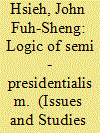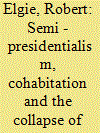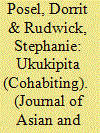| Srl | Item |
| 1 |
ID:
107320


|
|
|
|
|
| Publication |
2011.
|
| Summary/Abstract |
Semi-presidentialism is a vague term which may refer to several different forms of government. This paper explores only one special type of semi-presidentialism, and shows that, even under similar institutional arrangements, actual practices may differ greatly. The two cases, France and Taiwan, share the basic features of such a system, though the French president has more powers than his counterpart in Taiwan. But interestingly, when the presidents party/coalition has been in the minority in parliament, the French president has frequently chosen to compromise and to cohabit ate with a prime minister supported by the parliamentary majority, while his counterpart in Taiwan has decided to confront the parliament by forming a minority government. As argued in the paper this can be accounted for by strategic behavior on the part of the president and the parliamentary majority in manipulating the loophole created by such a system. History and the nature of social cleavages have something to do with it as well.
|
|
|
|
|
|
|
|
|
|
|
|
|
|
|
|
| 2 |
ID:
095001


|
|
|
| 3 |
ID:
132310


|
|
|
|
|
| Publication |
2014.
|
| Summary/Abstract |
In South Africa non-marital cohabitation rates among Africans remain low, and particularly in the context of very low marriage rates. Through qualitative interviews with urban isiZulu-speakers we explore attitudes towards ukukipita (cohabiting) in contemporary Zulu society. These in-depth interviews capture the meanings associated with non-marital cohabitation and they provide insights into why cohabitation is widely viewed as unacceptable in Zulu society unless the man has initiated ilobolo (bridewealth) negotiations and concrete marriage plans are in place. Cohabitation without ilobolo payment is widely interpreted as akin to behaving disrespectfully towards Zulu culture and tradition, the immediate family and the Zulu community more broadly.
|
|
|
|
|
|
|
|
|
|
|
|
|
|
|
|